The case of Barbulescu v. Romania Application no. 61496/08 [2016] ECHR 61 (12 January 2016) (available here ) clearly set out the limits in relation to monitoring employee communications. The case involved the dismissal of an employee as a result of his personal communications at work, which were monitored. The Grand Chamber of the European Court of Human Rights confirmed the conditional nature of the right to privacy (Article 8, ECHR) and held that, in order to fulfil their positive obligation to protect the right to privacy, Member States should ensure that employers take measures to ensure that appropriate safeguards are in place to guard against abuse of monitoring communications and other interference with privacy rights, rather than to outlaw this activity per se. Such measures include full and clear notification of the monitoring, in advance, limiting monitoring to what is strictly necessary to achieve the specific aim, using the least intrusive methods and providing further information to the employee if the content rather than the flow of communications is to be monitored. The ICO has produced ‘The Employment Practices Code’ that provides sound advice and guidance, though caution must be exercised due to the publication date. Additionally, Part 3 of ‘The Employment Practices Code: Supplementary Guidance’ addresses monitoring at work. Again, please exercise caution due to the publication date; the latest case law and the GDPR are not included, but the principles and advice remain sound. A Data Protection Impact Assessment that takes into account the principles provided in the judgment of the above case would demonstrate compliance and best practice.
Information Commissioner’s Office
Although the sanctions for breaching the provisions of the GDPR have been widely circulated and are far higher than the current maximum fine (£500,000), the ICO has stated many times that fines are the last option; providing support and assistance are greater priorities and the first course of action that they will take, depending on the circumstances of course. In the event of a data breach, the ICO will take into account the actions, overall approach and compliance efforts of the data controller responsible. Therefore, it is of importance not only to comply with the provisions of the GDPR, but to understand the ICO’s stance on relevant issues. Follow this link to view the ICO’s strategic goals in respect of information rights, from 2017 to 2021: https://ico.org.uk/media/2014134/20170413icoinformationrightsstrategicplan2017to2021v10.pdf
UK Data Protection Bill
The GDPR will be in force from 25 May 2018, meaning that the UK must comply with its requirements as a European Member State. However, on exiting the European Union, the UK has stated that it will retain European standards in respect of data protection and will incorporate the GDPR into its national legislation. This legislation will also incorporate the provisions of the Policing Directive (which the UK currently opt out of) and also account for national security considerations, which is outside the scope of the GDPR.
The UK Data Protection Bill is currently progressing through Parliament. The various stages, and links to information from each can be viewed here.
The Information Commissioner’s Office has provided briefings during the process. Here can be seen ‘Annex II’, in which the ICO responds to points raised during the Committee Stage scrutiny and emphasises issues that remain of interest or concern. Previous communications from the ICO on this topic can be accessed here.
Other useful information about the Data Protection Bill:
The wording of the Data Protection Bill (HL Bill 66): https://publications.parliament.uk/pa/bills/lbill/2017-2019/0066/lbill_2017-20190066_en_1.htm
Data Protection Bill Factsheet: https://www.gov.uk/government/uploads/system/uploads/attachment_data/file/644634/2017-09-13_Factsheet01_Bill_overview.pdf
CENTRIC attend ‘Emerging and Current Challenges in Cyber Crime’ event at University of Suffolk
On Tuesday 9th January CENTRIC visited University Of Suffolk at the Ipswich Waterfront Innovation Centre to present a selection of our research and activities.
The event, hosted by University of Suffolk, was a huge success and focussed on Emerging and Current Challenges in Cyber Crime. Attended by academics, Law Enforcement Agencies and businesses the event was an opportunity for all parties to come together and find out how University of Suffolk aims to become a major research centre in Cyber related research.
You can read more about the event here.
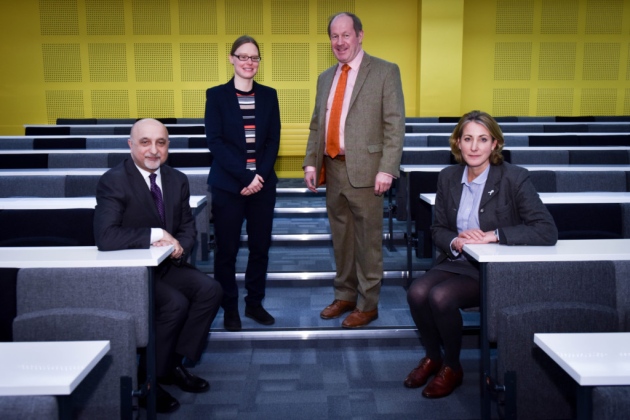
Left to right: Professor Mohammad Dastbaz, deputy vice-chancellor; Helen Gibson, Operations Lead CENTRIC; Tim Passmore, police and crime commissioner; Emma Bond, Professor in the faculty of Arts, Business and Applied Social Science at University of Suffolk
Picture: James Fletcher Photography
CENTRIC Director Speaks at the CEPOL Research and Science Conference in Budapest
From the 28th – 30th November 2017 the CENTRIC Director, Profesor Babak Akhgar, spoke at the CEPOL Research and Science Conference – “Innovation in Law Enforcement” that took place in Budapest.
The CENTRIC Director presented the EU funded UNITY project to the delegation and discussed advanced Community Policing training for LEAs and a baseline view of Community Policing. He also spoke about the evolution of the Community Policing concept currently being developed into a serious game as part of the UNITY project.
For further details about the UNITY project visit our project pages, for more information about the CEPOL conference visit the CEPOL website.
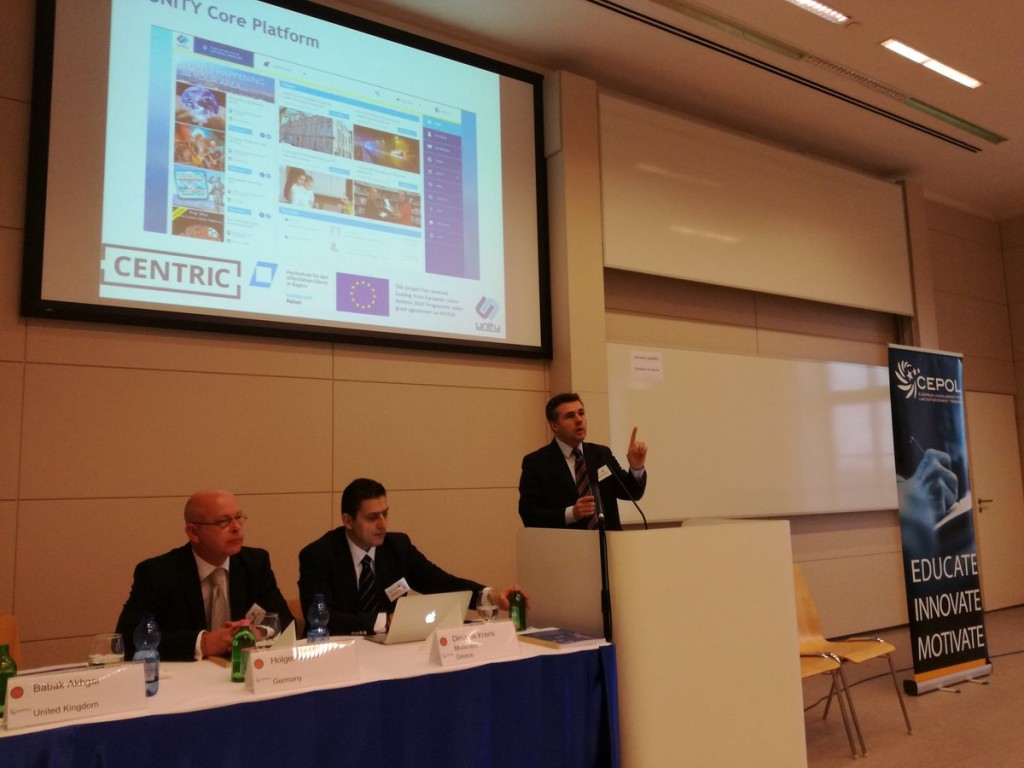
UNITY Consortium meeting in Leeds
This week the CENTRIC team have been in Leeds for the final consortium of the UNITY project.
The meeting was very successful and during which the CENTRIC team discussed community policing and the serious game currently being developed around the community engagement concept.
Successful CENTRIC event at SRIEE 2017 in Tallinn
On November 14th and 15th the CENTRIC team attended the 2017 Security Research, Innovation and Education event (SRIEE 2017) in Tallin, Estonia.
The Security Research Conference, organised by the European Commission, had two high-level panels focusing on “Conveying the future needs of Practitioners to the Research Community” and on “The future of security research.
As part of our seventh anniversary celebrations, CENTRIC held its own panel event on the second day of the event by showcasing the impact of its research funded by the European Commission and DG Home. The session introduced CENTRIC and demonstrated its real impact on security in terms of research, technological capabilities, and expanding the knowledge of security stakeholders in their mission to protect the citizens of the EU. The event consisted of two panels; Are the risks of cybercrime being taken seriously? and What are the emerging threats to developing successful counter-terrorism strategies?.
As part of the conference the CENTRIC team offered conference attendees a demo of our virtual reality projects, AUGGMED and ATLAS, at the CENTRIC exhibition stand. The team also provided a wide range of information to many attendees about all of CENTRIC’s projects and capabilities.
Feedback from the event was excellent and CENTRIC is extremely grateful to its external colleagues that attended the event and provided an outstanding contribution to the panel discussion.
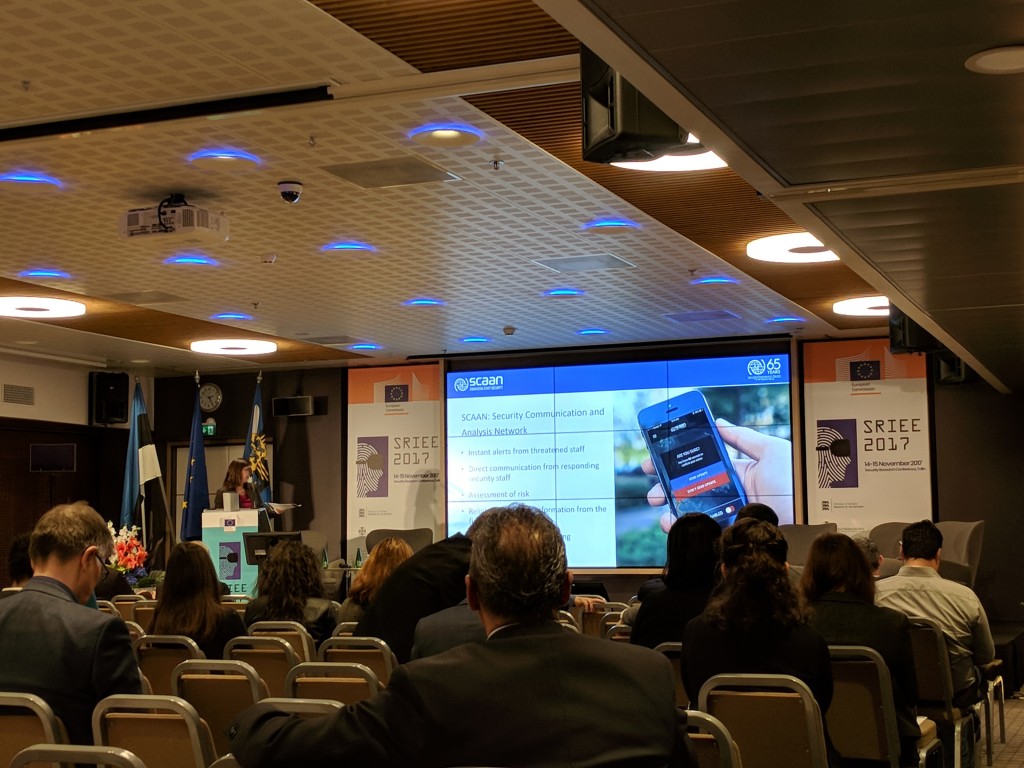
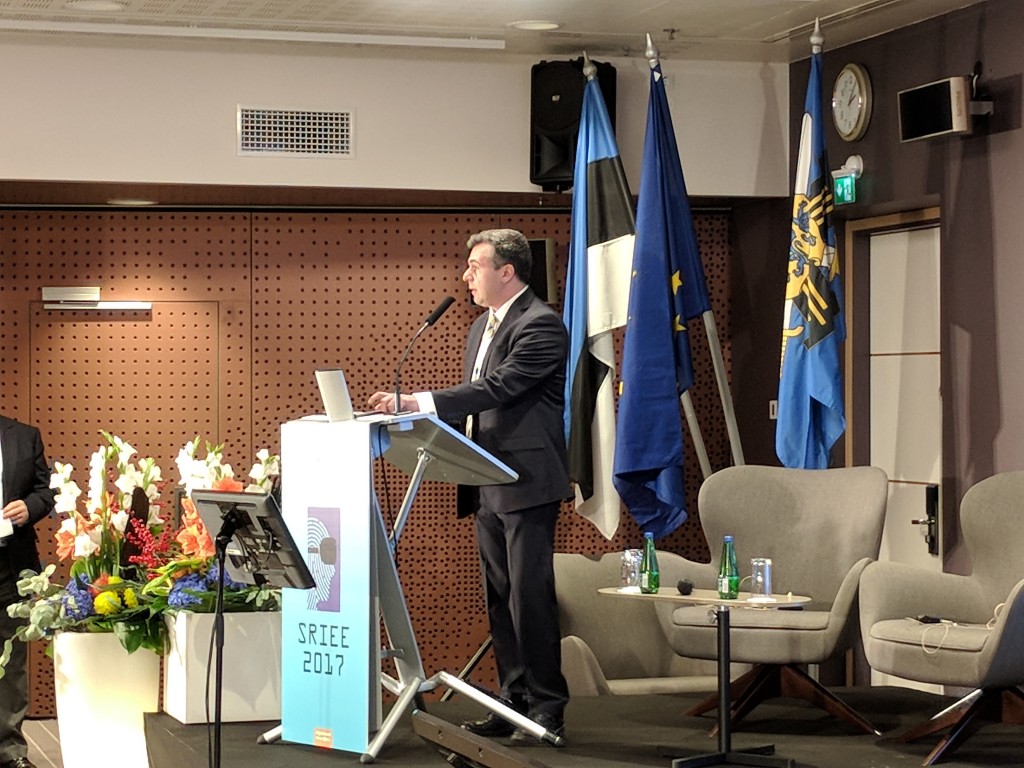
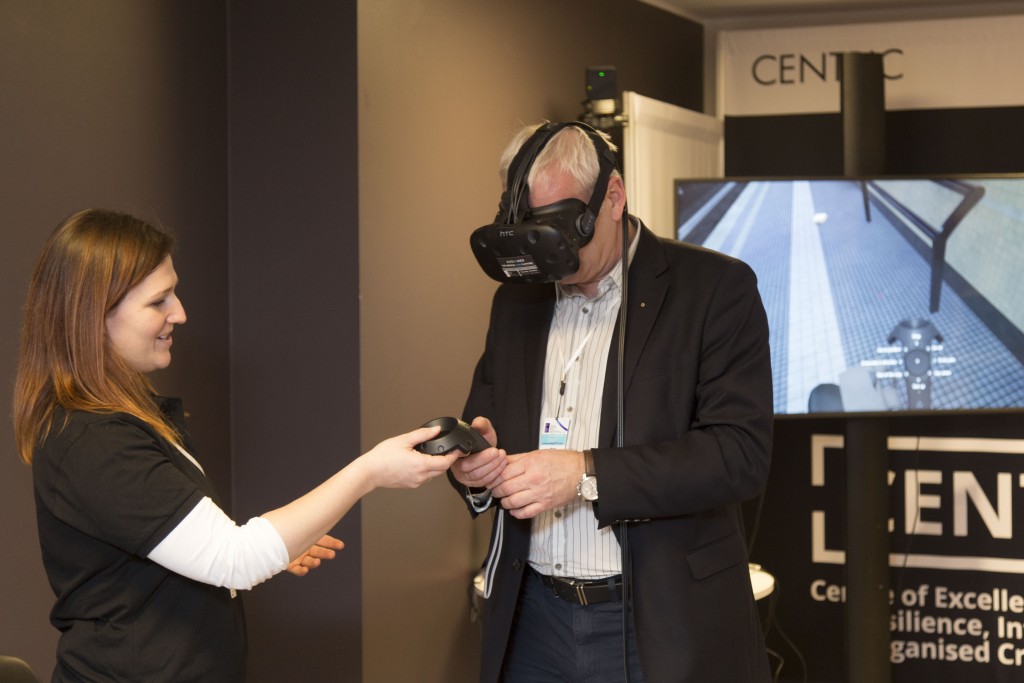
CENTRIC present 3 papers at the NGCP 2017 Conference in Crete
From the 25th – 27th October, the CENTRIC team were at the NGCP (Next Generation Community Policing) International Scientific Conference in Crete.
The conference was a huge success and included the presentation of fifty-six scientific papers, of which CENTRIC presented 3, more details on these can be found below;
Marzell, L., Brewster, B. (2017) A Framework for Trust. Next Generation Community Policing Conference. Crete, 25-27th October 2017
Community Policing across the UK, Europe and further afield, is the bedrock for keeping society and its communities and citizens safe, secure and resilient. Underpinning this approach is the requirement for trust. The Community Policing Architecture Framework (CPAF), is a mechanism enabling us to better understand and share information at a community level, and provide an essential building block to create and sustain trust and, ultimately, the means by which shared Community Policing outcomes can be achieved. The CPAF creates a mechanism to better understand and share information at a community level, and provide an essential building block to create and sustain trust and, ultimately, the means by which shared CP outcomes can be achieved.
Brewster, B., Gibson, H., Gunning, M., Akhgar, B. (2017) Policing the Community Together: the Role of Technology in Citizen Engagement. Next Generation Community Policing Conference. Crete, 25-27th October 2017
A common theme throughout community and neighbourhood policing strategies establishes the need to target improvements in the relationship and level of engagement between the police and communities aiming to move away from reactive policing models towards a more proactive philosophy. Smartphones and other ICTs are often seen as a vector which can instil a culture of proactive engagement. This research builds upon existing research suggesting technologies for crime prevention should be designed to support communications and problem-solving rather to simply disseminate information, unpacking a number of the core concepts central to participation and effective engagement; social capital, public participation and social and digital inclusion. Moreover, examples, which target the engagement of communities through the use of technology, of wider initiatives are comparatively discussed, before reflecting on the empirical evidence and experiences gleaned through the EU H2020 funded ‘UNITY’ project, a project that sought to establish effective strategies for engagement between police and citizen communities.
Day, T., Gibson, H., Gunning, M., Akhgar, B. (2017) You are not Alone: Enhancing Humanitarian Field Staff Security. Next Generation Community Policing Conference. Crete, 25-27th October 2017
As the dangers of terrorism, natural disasters and crime become more prominent, the awareness and responsibility for personal safety has increased. Aid and field workers are often at risk given their locations in remote, hostile or unstable environments. IOM (International Organisation for Migration – the UN Migration Agency) has over 10,000 operational staff in 166 countries including zones of conflict, disaster and political instability. IOM has recognised that the use of technology, including mobile applications and a centrally available dashboard, could be combined to provide supplementary security capabilities to IOM staff and those responsible for their safety. SCAAN (Security Communications and Analysis Network) consists of a cross-platform mobile application supporting a simple emergency alerting system, opt-in GPS tracking, on-the-ground reporting, direct messaging with the operations centre, and instant notifications of major disasters and attacks. In parallel, those in the operations centre can monitor their staff, respond to incidents in a timely fashion, request and receive updates from those out on missions, and generally enhance their situational awareness of current IOM operations. This researched explored the iterative, co-creative processes with IOM that led to the requirements, development and testing of SCAAN as well as the acceptance of and the challenges raised by such a solution from IOM staff.
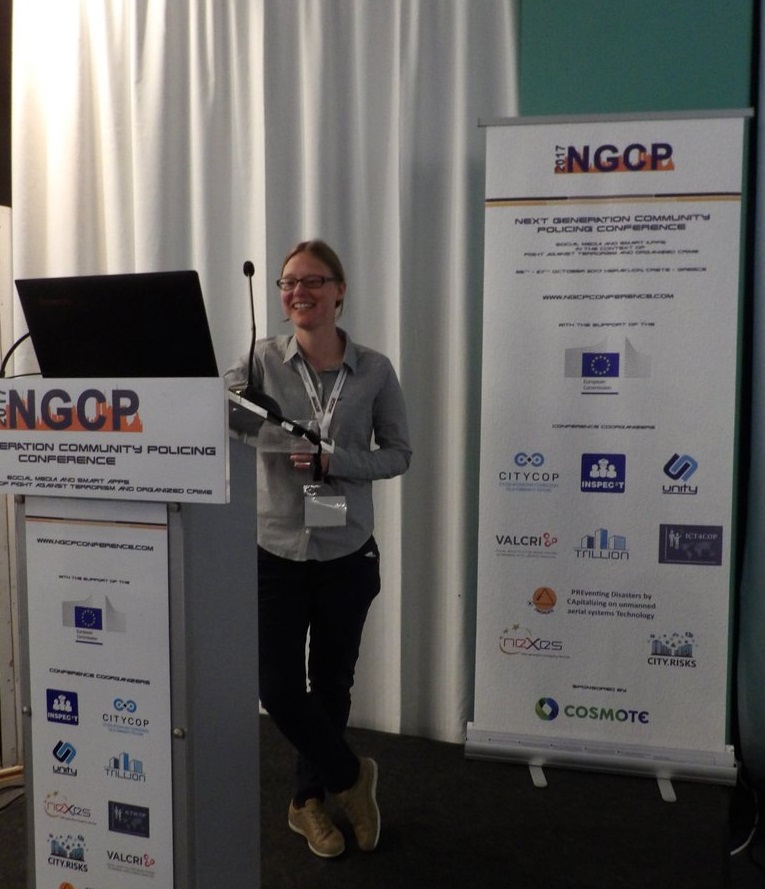
Dr. Helen Gibson presenting at the NGCP Conference in Crete
CENTRIC produces GDPR Guide for the Police and Crime Commissioners’ Chief Executives across the UK
In recognition of the need to implement changes and engage in preparations to achieve compliance by May 2018 CENTRIC has produced a GDPR Guide for the Police and Crime Commissioners’ Chief Executives across the UK. This guide was presented by CENTRIC to the Association of Policing and Crime Chief Executives in October 2017.
The GDPR Guide sets out requirements and highlights key issues in a reader-friendly, accessible way and will be available for wider circulation from the CENTRIC website very soon.
A training session was held by CENTRIC at the joint annual conference for the Association of Policing and Crime Chief Executives and PaCCTS (Police and Crime Commissioner Treasurers). The session presented key points from the Guide and addressed practical implementation issues. CENTRIC are currently preparing updates and supporting documents to continue with this work.
CENTRIC is also currently working on a Policing Guide, which addresses data protection requirements specifically for law enforcement purposes. This will also be available here, on the CENTRIC website in January 2018.
CENTRIC presents at UNESCO expert meeting in Paris
Tony Day (CENTRIC Technical Lead) presented the ‘Technical Aspects of the Dark Web’ on behalf of CENTRIC at an expert meeting in Paris on 14th September 2017. The meeting was organised by UNESCO’s Information for All Programme (IFAP), and gave an opportunity for representatives of UNESCO and external participants to discuss the challenges of cyber threats and ways to improve national strategies through innovative and global solutions.
See the full press release here.

